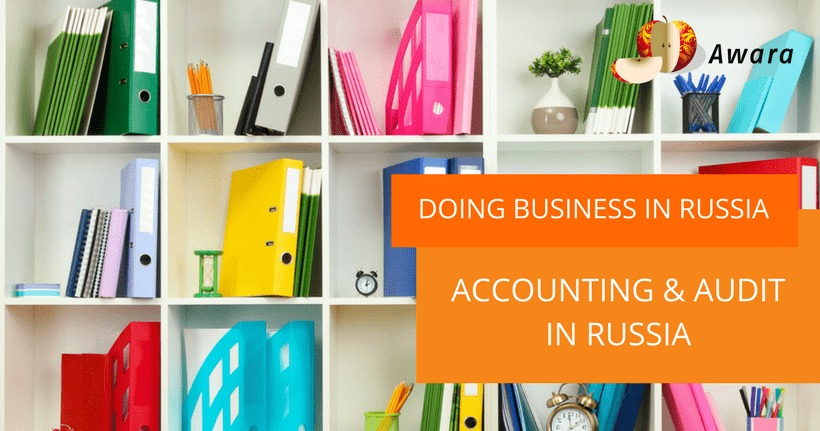
- Sergey Minyailo
- November 21, 2016
- 4975
Doing Business in Russia: Accounting and Audit in Russia – The New Way
Russian statutory accounting rules (RSA – also referred to as Russian Accounting Standards, RAS) are regulated by norms on a hierarchy of four levels. At the highest level there is the Accounting Law (passed by the Russian parliament, the State Duma). At the second level there are the accounting standards (“PBU” in Russian, short for Polozheniya po Bukhgalterskomu Uchetu) issued by the Russian Ministry of Finance. The third level is comprised of guidelines, instructions, recommendations and other similar documentation. They are drafted and approved by federal agencies, ministries, other governmental authorities, association of professional accountants on the basis of the first and second level documents and as a clarification for them. This includes a company’s Chart of accounts and relevant instructions.
We may consider as the fourth level of regulations the rules that the company (or entrepreneur) establishes within the framework permissible by the government regulations. These concern areas which are not completely covered by the law, or where the company is left with a choice. The company specific regulations are set out in the company’s “accounting policy”.
The new Accounting Law was enacted in 2011 and replaced the previous law at the beginning of 2016 (Federal law No. 402). The discussion hereunder is in reference to the new law if otherwise not indicated.
The most important changes brought by the new law:
- Recognition of possibility to outsource accounting. The new law explicitly recognizes that outsourcing of accounting is an option alongside of employing an in-house Chief Accountant. Accounting outsourcing is, however, not available for banks.
- The role and qualifications of the Chief Accountant. The role and qualifications of the Chief Accountant have been clarified. Statutory competence criteria have been set in respect to Chief Accountants of open stock companies, insurance companies, and various forms of investment companies. The requirements are that the employee possesses a higher professional education, specialized work experience in the field of accounting and financial reporting or audit of at least 3 years out of 5 last calendar years (at least 5 years out of 7 last calendar years in the absence of relevant higher education in accounting or audit), and no conviction for economic crimes.
- Flexibility with source (primary) documents. An important change in the law has to do with source (primary) documents which must be in place to support the accounting transactions. The law scraps the earlier requirements to standardized document forms that are a hangover from the Soviet system. Now the template for source documents will have to be adopted by the company itself with approval by the Chief Executive Officer. In addition, the law now allows for the primary accounting documents to be drafted in digital form and hence be approved by a digital signature. (See below for more details.)
- Entities are exempt from keeping full statutory accounting records. In accordance with the current law individual entrepreneurs and private professionals are exempt from the duty to maintain accounts in conformity with the accounting laws and standards if they maintain their tax accounting records in conformity with the tax laws regulating their specific tax regimes.
- Branches and representative offices (or other subdivisions) of foreign companies may waive the requirement to keep statutory financial accounting (bookkeeping) books as long as they follow the tax accounting rules prescribed by the Russian Tax Code (keeping of all the necessary tax ledgers for each type of tax applicable to the entity’s business).
- The law now removes the requirement that documents relating to monetary operations be approved jointly by the Director and Chief Accountant, allowing for companies to adopt their own internal policy for such approvals.
- The PBUs issued by the Ministry of Finance are largely based on International Financial Reporting Standards (IFRS), with each new amendment aimed at bringing RAS closer in principle to IFRS. In addition to the PBUs the Ministry of Finance regularly issues detailed instructions as to the application of the PBUs in specific situations. Examples of such instructions are the compulsory unified chart of accounts that all Russian firms must use and the detailed instructions on how to calculate the cost of goods sold. The standard chart of accounts is prescribed for all Russian companies by the Ministry of Finance (Order No. 94n). According to the chart each balance sheet and income statement account is given a two digit number. This two digit coding must be adopted by each company and cannot be changed through adoption of internal accounting procedures, but naturally they may be adapted to specific requirements by introducing a needed amount of subaccounts.
Russian Tax Accounting
The Russian Tax Code requires taxpayers as well as permanent establishments (PEs) to keep separate accounting records for tax purposes. As with many other countries, tax accounting rules differ from statutory financial accounting principles. This can create major differences in calculations, specifically for example in regards to the treatment of depreciation, reserves, interest expenses (capitalization or deductions of interests) and losses. For many companies the existence of separate Tax Accounting rules means a third set of books must be kept alongside the Russian Statutory Accounts in addition to the books kept in accordance with some international accounting principles such as IFRS and US GAAP.
Examples of the Russian Tax Code providing for the application of individual company accounting policies are the requirements to adapt rules for “keeping of tax records” and “determination of the tax base”. In this regard, the Russian Tax Code (art.313, 167) allows an option for companies to choose amongst tax accounting principles. However the Russian Tax Code also details a fall-back set of principles should the company choose not to adopt its own set of custom principles. Companies must also consistently maintain their adopted tax accounting policies from one year to the next, unless legislation prescribes otherwise or the company develops a superior method of maintaining accounting policies and sees fit to change them. It is necessary that in both of these situations the newly adopted policies take effect from the beginning of the financial year.
It should be noted that a company must issue separate regulations on financial accounting policy and tax accounting policy, respectively.
Russian Accounting Standards vs. International Standards such as IFRS and US GAAP
During the time of the Soviet Union, accounting in Russia was traditionally used for statistical purposes. All enterprises reported only to the state and accounting was largely put in place for the benefit of the state only. Since the break-up of the Soviet Union in 1992, Russia has undergone radical changes to shift from a centrally planned economy to a market economy. In doing this, the shift in accounting policy had to reflect a shift in the process for accounting, from a system of state economic administration to a process of the private business community. This posed problems for the traditional accounting system, as a shift also had to occur in regards to the end use of accounting records. With the new market economy, a system of financial reporting had to be put in place that satisfied the requirements of investors, creditors and other interest holders. This contrasted to the previous state system.
In more recent years, this initial transition has been accelerated even further through the Russian Government identifying the necessity to align Russia’s accounting principles with those of IFRS. Although this alignment has taken place to some degree, the previous state-centered traditions have still negatively affected the contemporary development of accounting policy. While there are now some principles resembling those of IFRS, the implementation of these principles in practice still have some flaws.
The problems are often caused by the restrictions that prescribe a source document to be in place before specific accounting entries can be made. As a consequence, accounting statements prepared according to RAS do not necessarily show the true account of accruals and do not convey a true and fair value of the assets or liabilities of the entity. Therefore, in order to understand the financials of a Russian company in a true and fair view, the statements need to be restated in international accounting standards such as IFRS (International Financial Reporting Standards), US GAAP (US Generally Accepted Accounting Principles) or any other standard used by the parent company. In doing so, there are a number of difficulties to overcome.
The main shortfall in the development of RAS in comparison with IFRS arises from the fact that the accounting principles still favor the tax authorities as the main recipient of the information. This is in direct contrast to IFRS basic root principles, in that financial and accounting information should be produced specifically in the interests of accuracy and fairness towards shareholders and relevant stakeholders.
Another significant shortcoming is form over substance. Russian administrative practice in all fields of activities and life is quite formalistic. As a consequence of this obsession with form, Russian accounting practice has been quite slow to adapt to IAS rules where subjective judgment is often needed. In addition to this, RAS is in theory “substance over form; whereas in reality it is “form over substance”.
RAS does not provide guidance on the procedure for consolidations, business combinations, purchase price allocation, impairment of property, plant & equipment, share-based payments or employee benefits. This means that in fact a professionally managed Russian subsidiary company has what is needed to make financial reports on four different levels:
- Russian statutory financial reports (statutory bookkeeping)
- Russian tax accounting reports
- Group financial accounting reports
- Management accounting reports
Primary Source Documents
As elaborated on above, the new accounting law introduced considerable flexibility in regards to the form of supporting primary (or source) documents and abolishing the strict and confusing rules presently in force in Russia.
Now the template for source documents will have to be designed and adopted by the company itself with approval by the chief executive officer. In addition, the law now allows for the primary accounting documents to be drafted in digital form and hence be approved by a digital signature.
Each operation has to be supported by an appropriate source document or a set of documents.
According to the new accounting law the source documents must contain at least these mandatory requirements:
- Title of the document
- Date on which the document is drawn up
- Name of the entity
- Nature of the business operation
- Volume and monetary indicators of the business operation (and other such descriptions)
- Positions of officials responsible for the completion and proper documentation of the relevant transactions
- Personal signatures (and other needed identification) of these (above mentioned) officials.
For example, if one company provides services including consulting or legal services to another company in Russia, it must draw up a specific source document, including all the above reference details. In practice, such a document is called a “certificate of acceptance of services”. This certificate should be signed by both the service provider and the client.
Although the new accounting law now contained the welcome reform of abolishing the mandatory templates for source documents, there is a risk that the tax authority is now trying to fulfill the vacuum and claim the right to impose new mandatory forms on taxpayers. The Federal Tax Service has already issued numerous such template source documents. One of these is the template for a so-called “Consignment Note” (form TORG-12) which according to the practice the tax authority adheres to is considered as a mandatory accounting document for justifying expense and VAT deductions in connection with sale of goods. The tax authority requires that such a consignment note is signed by both the purchaser and the seller. For the purpose of supporting sales of fixed assets the tax authority has issued another template document called “Certificate of Acceptance of Fixed Assets” (form OS-1). In addition to these the tax authority has also issued templates for a waybill (Form 1-T).
The Russian Tax Code mandates that for tax compliance purposes the transactions will have to be supported by the same source documents as those required by the Accounting Law. According to the profit tax laws the deductibility of expenses is subject to proof that they are economically justifiable and properly documented. Concerning expenses that have been incurred in another country the source documents have to be drawn up in accordance with ordinary business practices applicable in the relevant state.
Since 2012, Russian law allows the use of completely automated system of electronic document flow between both companies and governmental bodies. This includes electronic contracting, electronic signatures, electronic invoices (VAT invoices and other primary documents are among them), and allows their use for tax accounting.
Storage of Accounting and Tax Records
According to the Tax Code (art. 23), accounting records as well as taxation documents including tax receipts must be stored for 4 years Art23(1)(8). However, it should be noted that the storing period specified in the Law on Accounting (art. 29) is 5 years. When claiming Deductions for losses relating to prior periods (Loss-Carried-Forward Rule), the corresponding accounting records will have to be available for all those periods to which the loss carried forward refers to. The Loss-Carried-Forward rule allows for the Deduction of losses relating to periods as far back as ten years (art. 283(2), Tax Code).
Audit in Russia
The Russian Law requires that the following entities have their accounting records fully audited by a licensed auditor (article 5 of the Russian Audit Law) once every financial year:
- indicators in financial statements of the company for the prior year exceed the following limits: value of sales of more than 400 million rubles, or the amount of the balance sheet assets exceeds 60 million rubles;
- the company is a joint stock company, regardless of the indicators;
- securities of the company are issued to organized trading;
- the company is a credit or insurance organization;
- the company is a microfinance organization;
- the company presents consolidated financial statements;
- the company is a developer that attracts funds of participants of shared construction of multi apartment buildings and (or) other real estate;
- in other cases provided by law.
A Russian audit requires not only a systematic verification of the accounts, but also a meticulous examination of the procedures and accounting procedures of the enterprise to ensure that the books have been kept in the manner prescribed by the law as per the accounting and tax law.


